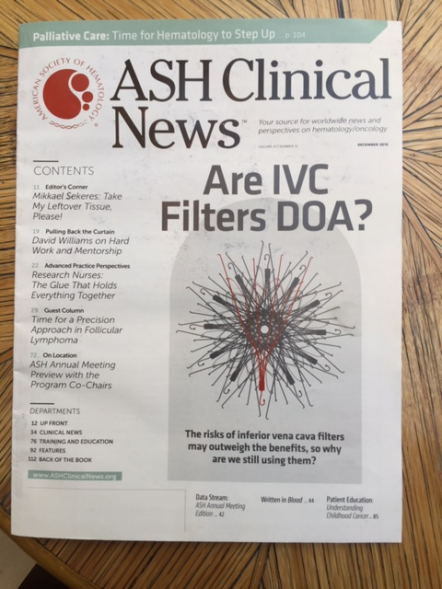PHOENIX - Dec. 14, 2015 - PRLog -- In an article published this month in the American Society of Hematology publication, Ash Clinical News, Dr. Anita Rajasekhar, a hematologist from the University of Florida, and Dr. Joseph Stavas, professor of radiology at the University of North Carolina, were invited to debate the question: “Do inferior vena cava (IVC) filters still have a role in managing thrombosis?”
Although the two doctors agreed that there "always will be a small subset of patients with an absolute contraindication for anticoagulation who would benefit from IVC filters." They were equally aligned in their opinions that the devices can pose serious risks, particularly when retrievable filters are left in place for too long, and that variability in the guidelines for when to place filters has led to filter placement in cases where the risks may far exceed any possible patient benefit.
Dr. Stavas expressed concern that the increased use of IVC filters since the 1970's is not supported by documented increase in patient survival rates, stating that, "the evidence is all over the chart.” According to the radiologist, for many doctors, the devices have become a "crutch for managing patients with thrombosis, providing a false sense of security." Stavas pointed out that a serious IVC filter risk is their potential to migrate to the heart causing a pulmonary embolism, the very potentially fatal event they are intended to prevent.
Dr. Rajasekhar furthered Stavas' point, stating that the only evidence-supported use of IVC filters is to mechanically "prevent a lower-extremity DVT or a pelvic DVT from embolizing to become a potentially fatal PE." According to Rajasekhar:
"An IVC filter does nothing to decrease a person’s inherent tendency to develop a clot. In my practice, I see many patients who are predisposed to thrombosis...and placing a potentially thrombogenic foreign device onto their veins does them a disservice in the long term."
Both Rajasekhar and Stavas recommended that stricter guidelines be created for determining which patients should be implanted with IVC filters. The doctors proposed that the new guidelines should account for the inherent risks of device placement, failure, and retrieval; including complications such as fracture, tilting, and migration.
IVC Filter Manufacturers Face Lawsuits
Amidst the controversy over IVC filters in the medical community, several IVC filter manufacturers are currently under legal fire for allegedly withholding vital information from the FDA and from the public, and for marketing retrievable filters as safe for long term use without evidence to support such claims. In light of recent studies, the FDA now recommends that retrievable filters be removed as soon as possible after pulmonary embolism risk has passed. Around 1000 adverse event reports have been received by the FDA involving complications from IVC filters. One of the most common complaints is of the filter, or a piece of the filter, breaking off and migrating through the patient’s body.
The Arentz Law Group, a premier medical device injury law firm is offering free legal consultations nationwide to those who have experienced IVC filter injuries. IVC filter patients who have experienced filter fracture, tilting, migration, vein or organ puncture, or other injury are encouraged to visit ArentzLaw.com or call 1-800-305-6000 for more information.
Contact
Arentz Law Group
18003056000
***@arentzlaw.com
Photos: (Click photo to enlarge)

Read Full Story - Are IVC Filters Worth The Risk? | More news from this source
Press release distribution by PRLog